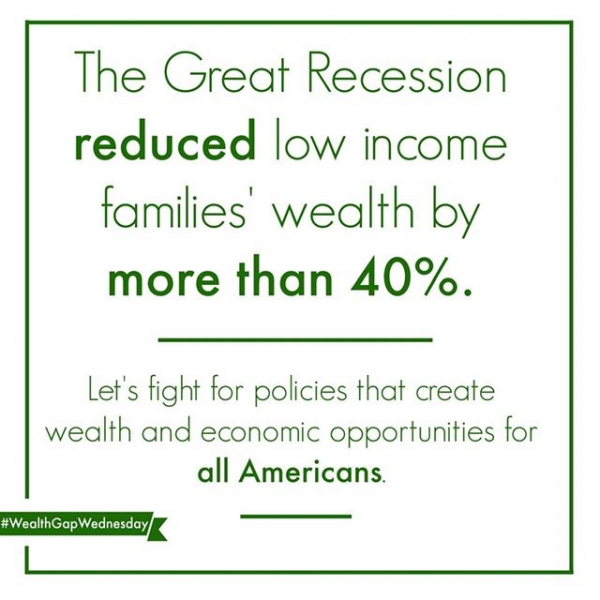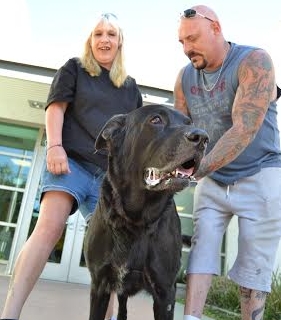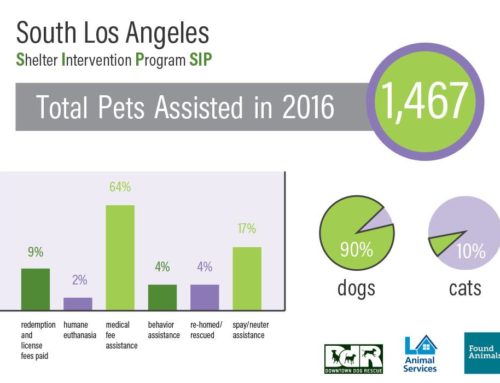One of the most common reasons why people surrender their animals is: “I’m moving and I can’t take my pet.” In 2014, across the six Los Angeles Animal Services shelters, a total of 296 cat owners and 835 dog owners cited moving as the reason for turning in their dog or cat. The other most common reasons that followed were having no home at all (claimed by 20 cat owners and 72 dog owners) and landlord issues (245 cats and 955 dogs came into the system due to this problem.) Over the years, we’ve heard many passionate, animal-loving people say that these owners “dumped their pets in the shelter.” But I can’t help wonder — did they?
Please consider that many of the families that we serve earn less than $20,000 per year for a family of four. Consider that the average family earning minimum wage will spend 141 percent of their income struggling just to meet the most basic needs of food, shelter, and clothing. Now consider the choices they have to make — not necessarily that they want to make — when it comes to their lives and their animals.
Surely there is a percentage of people who never connected with their pet in the first place, and who should never should have acquired the pet to begin with. Perhaps moving was just an excuse used to surrender their animal to the shelter. However, based on our experiences at the South LA Shelter, this isn’t the case the majority of the time. We know differently. We see that most people do care. And they’re doing the best they can.
 Princess and Bruno are a good example of what we do. They were brought into the South LA shelter by their owner in tears. He never thought he would find himself in the situation he was in — out of work, with poor credit, having lost his home, and with no prospect of a permanent place to live. Their owner was basically homeless when a generous friend offered him a room to rent, on one condition: He could not bring his dogs. Fortunately for this man, our counselor Amanda was able to find foster homes for Princess and Bruno, and with the help of our volunteers Jennifer and Mia, we were able to find them loving forever homes. We were all too glad to help. But the point is, if their owner had not been in the financial state he was in, these two dogs would have never needed to be rescued. They had a loving home to begin with.
Princess and Bruno are a good example of what we do. They were brought into the South LA shelter by their owner in tears. He never thought he would find himself in the situation he was in — out of work, with poor credit, having lost his home, and with no prospect of a permanent place to live. Their owner was basically homeless when a generous friend offered him a room to rent, on one condition: He could not bring his dogs. Fortunately for this man, our counselor Amanda was able to find foster homes for Princess and Bruno, and with the help of our volunteers Jennifer and Mia, we were able to find them loving forever homes. We were all too glad to help. But the point is, if their owner had not been in the financial state he was in, these two dogs would have never needed to be rescued. They had a loving home to begin with.
According to Congresswoman Maxine Waters,“We have known for quite some time that there are widespread generational and systemic factors that exacerbate the racial wealth gap.” So why isn’t this income gap part of a larger discussion, especially when it comes to planning programs that save pets’ lives? Why aren’t we focused on narrowing the gap, which would benefit both people and animals?
Many of you, our cherished supporters, donated to help Nicole, her daughter Erica, and their dog Tippy. Enough money was raised to put them up in a Motel 6 for a month. But almost two months later, Nicole and her family are still homeless, despite all of our attempts to find her a safe place to live. While it is tough to find rentals that accept a big dog, it is even more difficult to find a place when one’s credit rating is low and a total monthly income is less than $1,500 a month. Even if Nicole can afford the monthly rental fee, we have yet to fid a landlord who will take a chance on her, her credit score, and her family. Lucky for her, she has been able to remain in a homeless shelter with Erica and Tippy, hopeful that a program or a property manager out there will help them in the near future.
We met Laura and her dog, Negro, through the East Valley Shelter Intervention Program about a week ago. She came in on Saturday to check in and give us an update on her situation: She is living on the street in a truck with her dog. She is hopeful that a program she recently enrolled in will help get her and her pup into a studio apartment soon. It is challenging for her to go to appointments with her dog, so she was able to find somebody in a similar situation to watch him while she is away. She pays him $60 a month to help her. Laura used to be a professional. She had a career and a home, and lost it all. She has been homeless for awhile, and due to her low credit score, hasn’t been able to rent an apartment to begin the process of rebuilding her life.
Then there is Alex and his dog Sunday live who on the street now. About a week ago they lost the space in the garage they had been renting for $50 a week. Alex is out of work with no income. How can he apply for a place to live without an income or acceptable credit? There are very limited numbers of subsidized housing, and few shelter beds for a person with a pet.
Family pets like this little guy with the cute underbite are walked into Amanda’s office (aka the shelter) every day by well-meaning families. They bring stories of being evicted, being deported, a loved one suddenly dying and their home being sold, landlords who change their pet policy suddenly or request a no pet policy overnight. If this family has bad credit and/or a fixed income, often there is only one choice — surrender your pet or become homeless. Sometimes we are able to help, like the stories listed above. But unfortunately, there are many we cannot assist, and that is by far the saddest part of the work that we do. Knowing some pets (and their people) have nowhere else to turn.
 There is not enough low income housing in Los Angeles. The numbers of people who need low cost housing is increasing every day. While it’s easy to mark “moving” as the reason why a pet is being surrendered to the shelter, the real reasons are deep and complex. They have more to do with personal finances and a family’s ability to move up and out of poverty, which is not an easy feat. If we are going to move the City of Los Angeles to a truly no-kill system, we must increase the minimum wage, vote to elect leaders who will advocate for the families living in poverty, and invest in building affordable housing that allows pets.
There is not enough low income housing in Los Angeles. The numbers of people who need low cost housing is increasing every day. While it’s easy to mark “moving” as the reason why a pet is being surrendered to the shelter, the real reasons are deep and complex. They have more to do with personal finances and a family’s ability to move up and out of poverty, which is not an easy feat. If we are going to move the City of Los Angeles to a truly no-kill system, we must increase the minimum wage, vote to elect leaders who will advocate for the families living in poverty, and invest in building affordable housing that allows pets.
The solutions are not simple, but they are here. Will our city implement them? Will our city support people who need a hand, who deserve a second chance, who have as much love to give their animals as anyone else does? We hope so. Until then, we’ll be at the shelters doing what we do.







